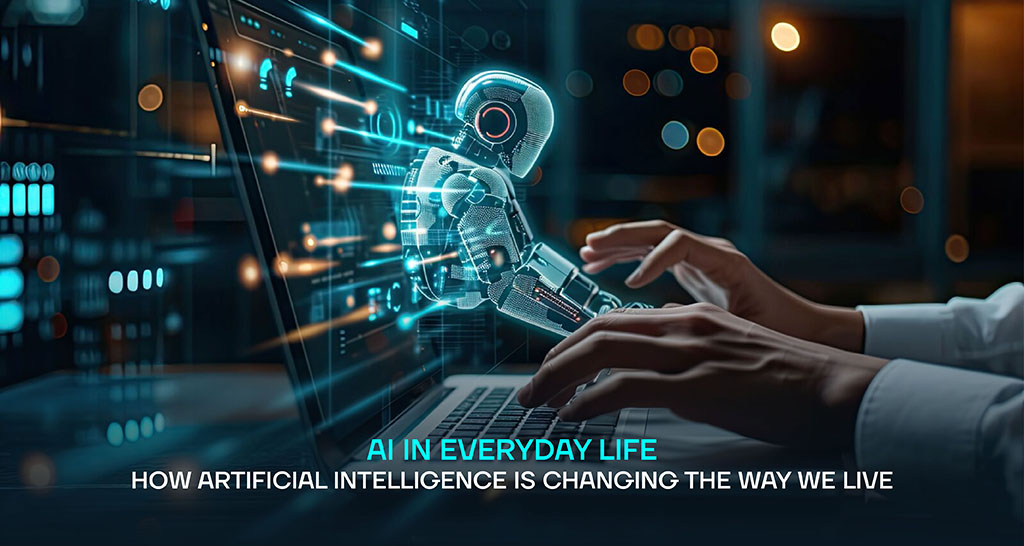Artificial Intelligence (AI) has transitioned from a mere futuristic idea often depicted in science fiction to a significant element of contemporary life. In recent years, AI has steadily woven itself into various facets of our daily routines, altering the ways in which we work, communicate, shop, learn, and engage with our environment practically AI in everyday life. It is no longer an intangible concept but a concrete reality that impacts numerous activities, ranging from our driving habits to our online shopping experiences.
This article will examine the transformative impact of artificial intelligence on our daily lives, highlighting its role in boosting productivity and convenience while also revolutionizing various industries.
- Smart Devices and Virtual Assistants
AI frequently appears in everyday life using smart devices and virtual assistants. Technologies like Amazon’s Alexa, Apple’s Siri, Google Assistant, and Microsoft’s Cortana utilize AI algorithms to comprehend voice commands, discern user intentions, and execute various tasks, including setting reminders, managing smart home devices, responding to inquiries, and delivering real-time information.
AI-powered voice recognition and natural language processing (NLP) technologies enable these virtual assistants to comprehend intricate human speech patterns, enhancing their efficiency and user-friendliness. Additionally, they adapt through user interactions, improving their ability to anticipate needs and provide tailored recommendations as time progresses.
- Personalized Recommendations in Entertainment
Artificial intelligence is transforming our media consumption habits. Platforms such as Netflix, YouTube, and Spotify employ AI algorithms to deliver tailored recommendations that reflect our viewing or listening preferences. These systems process extensive user data, encompassing the content we enjoy, watch, or listen to, and propose similar shows, films, or music tracks.
This customization goes beyond the realm of entertainment and encompasses shopping platforms such as Amazon, eBay, and Alibaba, which utilize artificial intelligence to suggest products aligned with your browsing and purchasing behaviors. One of the significant ways in which AI is transforming consumer experiences is by facilitating the discovery of new products or media that cater to personal preferences.
- AI in Transportation
Autonomous vehicles, commonly referred to as self-driving cars, represent one of the most prominent applications of artificial intelligence in the transportation sector. Organizations such as Tesla, Waymo, and Uber are making substantial investments in AI technology to develop vehicles capable of navigating roadways, circumventing obstacles, and executing decisions independently of human operators. The AI systems integrated into these vehicles process information from various sensors, cameras, and radar, enabling them to comprehend their surroundings and make instantaneous decisions that ensure safe driving.
Artificial intelligence influences your daily travel experiences, even if you do not possess a self-driving vehicle. Ride-sharing platforms such as Uber and Lyft leverage AI to enhance route optimization, forecast ride demand, and facilitate real-time connections between passengers and drivers. Furthermore, AI is advancing public transportation by implementing intelligent traffic management systems and innovative ticketing solutions, thereby improving urban mobility.
- AI in Healthcare
Artificial intelligence is swiftly revolutionizing the healthcare sector by enhancing diagnostic accuracy, personalizing treatment plans, and streamlining administrative operations. Tools powered by AI can analyze medical imaging, including X-rays, MRIs, and CT scans, to identify early indicators of diseases such as cancer, cardiovascular issues, and neurological disorders.
AI is not only enhancing diagnostic capabilities but also assisting healthcare professionals in customizing treatment plans. By utilizing machine learning algorithms, it is possible to evaluate a patient’s genetic information, medical background, and lifestyle elements to suggest personalized therapies, which may lead to better outcomes and reduced side effects.
- AI in Retail and Customer Service
AI has transformed customer service by allowing companies to deliver quicker, more effective, and tailored experiences. Chatbots and AI-powered virtual assistants can manage customer inquiries around the clock, offering immediate answers to frequently asked questions and assisting with problem resolution.
Artificial intelligence algorithms are increasingly employed in the retail sector to enhance inventory management, forecast consumer demand, and customize marketing strategies for individual customers. For instance, Amazon leverages AI technology to oversee its extensive inventory and suggest products to users based on their browsing history and preferences. AI-driven systems scrutinize consumer behavior to identify which products are likely to perform well and at what times, thereby optimizing stock management and minimizing the likelihood of overstocking or stock shortages.
- AI in Education
Artificial Intelligence is profoundly influencing the education sector by facilitating more personalized and effective learning experiences for students. AI-driven educational platforms such as Coursera, Duolingo, and Khan Academy deliver customized lessons that align with each student’s progress and preferred learning style. These platforms leverage data analytics and machine learning algorithms to evaluate individual strengths and weaknesses, thereby offering focused learning resources aimed at enhancing academic performance.
Artificial intelligence is increasingly being utilized to automate various administrative functions, including the grading of assignments and the tracking of student progress. This allows educators and administrators to allocate more time to teaching and enhancing student engagement, as AI systems manage the labour-intensive and repetitive tasks.
Conclusion
Artificial intelligence has become an integral part of our everyday lives, and its impact is expanding across numerous sectors. Whether we acknowledge it or not, AI is enriching our experiences by increasing convenience, tailoring interactions, and streamlining operations. Although challenges remain, including concerns regarding privacy and ethical considerations, the incorporation of AI into our existence is an undeniable phenomenon that is influencing the future in ways that are just starting to be comprehended. As AI technology advances, it is expected to introduce even more significant transformations in how we live, work, and engage with our surroundings.








